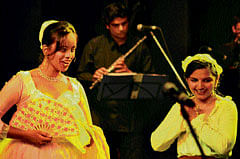In pursuit of music

If there is one thing that distinguishes this institution from all others, it is the preponderance of overwhelming music. K M Music Conservatory (KMMC) is the first school of its kind — not only in India, but in the whole of South East Asia. It boasts of uplifting music education in India and of giving back to music the special stature it has lost in recent decades. In a place where reverence for music crystallises, there is a hope to study it scientifically. By A R Rahman’s initiative, KMMC started as a great experiment that hoped to realise his dream project. While the desire to progress in the field of music has always been the aspiration of innumerable young people, it has hitherto been considered a futile quest. Today, KMMC answers the hopes of such young people by providing a viable alternative to the traditional degrees in medicine and engineering. Music and music technology have now come to stay in India, as has been the case in the west for over a generation. KMMC has quickly absorbed many relevant and significant elements from the western music tradition. In affiliation with the Middlesex University in London, the school has an extensive, full-time foundation programme in both vocal and instrumental western music, beginning in July every year. The foundation programme then leads to diploma and degree programmes.
Rahman, founder and principal, feels that the young in India must gain from the imperatives of contemporary society and be given the opportunity to learn and compete with their counterparts in the West, not merely by imitation, but by the creative application of technology. “We are passing through a fascinating period. Young men and women are highly accomplished and they know what they want. At KMMC, they can vent their musical aspirations,” says Rahman.
KMMC was started in April 2008 with the mission of making an Indian symphony orchestra. Rahman felt that the time was ripe; the nation had matured enough to accept innovative music. With due respect to the Indian classical music tradition, Rahman embarked on a project to promote western classical musical traditions among the young. The school teaches basic string instruments (violin, viola, cello and double bass); two traditions of piano technique (the standard Western technique and the highly dramatic Russian technique); and classical guitar. The school has also begun the tradition of harp playing.
KMMC emphasises on performance. Thus, students are encouraged to perform in front of their fellow classmates, friends and parents, and at special events throughout India. Western percussion includes the study of an amazing variety of instruments, such as the marimba, vibraphone and xylophone to name a few. The Indian percussion track introduces students to the tabla, taught in the best of the gharana tradition.
Sufi music
In the Hindustani vocal track, the mystical presence of the profound Sufi music and the traditional Sufi repertoire takes students back to the inexorable traditions of Hazrat Amir Khusro and the ever astonishing presence of Khwaja Moinnuddin Chishti and Hazrat Nizzamuddin Auliya.
The graduate programme offers majors in both Western and Indian classical voice. Piano, violin and percussion majors are some of the other choices, not limiting in scope.
Music history, theory and appreciation are some of the high points in the course; while courses in sight singing, ear training, composition and musicianship complement the choir class. There is also an important segment of audio engineering with emphasis on programmes such as logic, pro tools, and the like.
The A R Rahman Foundation can be referred to as a self-propelling mechanism, but it is the ideology that runs the system. The Foundation adopts under-privileged children from the neighbouring MGR school, refines their sensibilities, and teaches them how to play string instruments. It is the first step towards making a symphony.
The young aspirants owe their allegiance to the architects and pillars of this great institution: gracious Kareema Begum, the managing director of KMMC and Fathima Rafiq, the executive director, who in keeping with ethical traditions have given direction to the endless quest of Rahman, in his spirited and concrete adherence to the future of music.
For more information, check out: http://www.kmmc.in/
Deccan Herald is on WhatsApp Channels| Join now for Breaking News & Editor's Picks